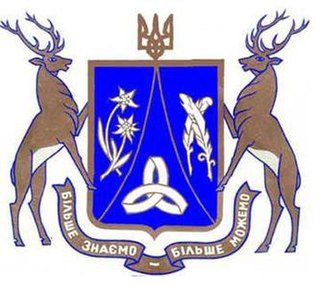
The Jagiellonian University is a public research university in Kraków, Poland. Founded in 1364 by King Casimir III the Great, it is the oldest university in Poland and one of the oldest universities in continuous operation in the world. It is regarded as Poland's most prestigious academic institution and one of the most prestigious academic institutions in Europe. The university has been viewed as a vanguard of Polish culture as well as a significant contributor to the intellectual heritage of Europe.
Nicolaus Copernicus (1473-1543) was a Renaissance polymath and astronomer.

The Warsaw University of Technology is one of the leading institutes of technology in Poland and one of the largest in Central Europe. It employs 2,453 teaching faculty, with 357 professors. The student body numbers 36,156, mostly full-time. There are 19 faculties (divisions) covering almost all fields of science and technology. They are in Warsaw, except for one in Płock.

The Polish Academy of Arts and Sciences or Polish Academy of Learning, headquartered in Kraków and founded in 1872, is one of two institutions in contemporary Poland having the nature of an academy of sciences.

The Belarusian State University of Informatics and Radioelectronics, also known as BSUIR, is a public Higher Education Institution accredited by the Ministry of Education of the Republic of Belarus. Nowadays it is a large educational and scientific complex in Minsk, Belarus. BSUIR was founded on March 15, 1964, and plays a leading role in preparing its students in the fields of computer science, radioelectronics and telecommunications in Belarus.

The Foundation For Polish Science is an independent, non-profit making organisation which aim at improving the opportunities for doing research in Poland. Established in 1990, registered in 1991, the Foundation's mission is to provide assistance and support to the scientific community in Poland. The strategy of Foundation For Polish Science is to support research groups and individual scientists, realised through individual prizes, grants and scholarships awarded by FNP, including the Prize of the Foundation for Polish Science. Its effort is widely regarded as crucial in transforming Polish science after 1989.

The Institute of Astronomy of Nicolaus Copernicus University in Toruń, known prior to 1 October 2019 in scientific publications as the Toruń Centre for Astronomy, is an optical and radio observatory located at in Piwnice, about 15 km north of Toruń, Poland. It houses two single-dish antenna telescopes, 32 metres and 15 metres in diameter, as well as the largest Polish optical telescope – 90 cm Schmidt-Cassegrain camera. The facility is operated by the Nicolaus Copernicus University. Also, photometry using 60 cm Cassegrain telescope is made and radio measurements of the Sun at 127 MHz frequency have been recorded on a daily basis since 1958 using a 23 m interferometer.

The Kazimierz Górski National Stadium, known for sponsorship reasons as the PGE Narodowy since 2015, is a retractable roof football stadium located in Warsaw, Poland. It is used mostly for concerts and football matches and is the home stadium of the Poland national team.

The University of Warsaw is a public research university in Warsaw, Poland. Established on November 19th, 1816, it is the largest institution of higher learning in the country, offering 37 different fields of study as well as 100 specializations in humanities, technical, and the natural sciences.

Uzhhorod National University is a Ukrainian state higher educational institution in the city of Uzhhorod in Ukraine.

Copernicus Science Centre is a science museum standing on the bank of the Vistula River in Warsaw, Poland. It contains over 450 interactive exhibits that enable visitors to single-handedly carry out experiments and discover the laws of science for themselves. The centre is the largest institution of its type in Poland and one of the most advanced in Europe. In 2018, since its opening, it has been visited by over 8 million people.

The Polish Children's Fund is a Polish non-government organization which supports highly gifted schoolchildren. It was established in 1981 by Ryszard Rakowski and late Jan Szczepański.

Museum of Warsaw is a museum in the Old Town Market Place in Warsaw, Poland. It was established in 1936.

The National University of Ostroh Academy is a Ukrainian self-governed (autonomous) research university that was established in 1994 by the Presidential Decree of April 12, 1994. The university considers itself a continuation of the historic Ostroh Academy which was the first East-European higher school.

The Precarpathian National University is a public research university in Ivano-Frankivsk. It is one of the oldest institutions of higher education in Western Ukraine.

Equality Parade is an LGBT community pride parade held in Warsaw since 2001, usually in May or June. It has attracted at least several thousand attendees each year; 20,000 attendees were reported in 2006, following an official ban in 2004 and 2005. In 2018, there were 45,000 attendees. In 2019, there were 50,000 attendees and then powering up to 80,000 in 2023. It is a member of EPOA and InterPride.

The Polish Chemical Society is a professional learned society of Polish chemists founded in 1919 to represent the interests of Polish chemists on the local, national and international levels.
Marek Żukowski is a Polish theoretical physicist and lecturer at the University of Gdańsk. He specializes in quantum mechanics, his area of interest in particular concerns the Bell's theorem and quantum interferometry.

The Nicolaus Copernicus Astronomical Center, also CAMK or NCAC, is a Polish scientific research institute of the Polish Academy of Sciences headquartered in Warsaw, Poland. It is a leading institution in the country in the field of astronomy.
Maciej Daniel Wojtkowski is a Polish physicist, specializing in physical optics and medical applications of optics, and founder and director of the International Centre for Translational Eye Research (ICTER) in Warsaw, Poland.

















